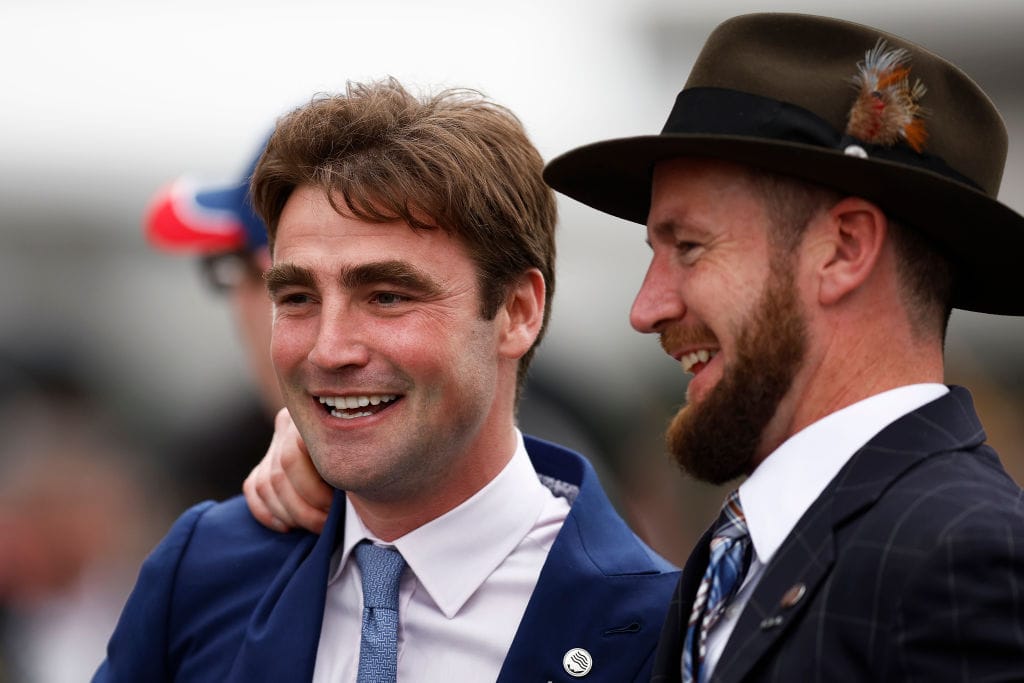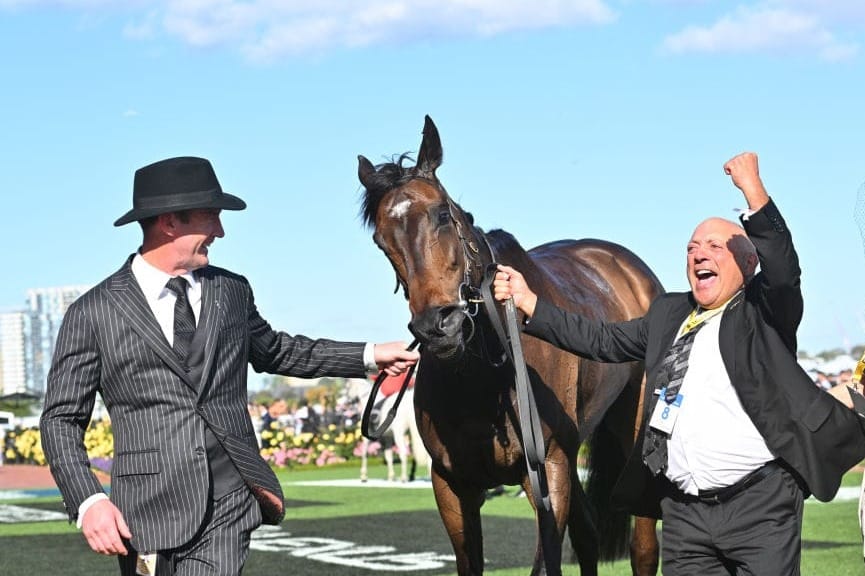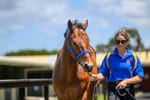When Pride Of Jenni raced away like Vo Rogue to win two Group One races during the Melbourne Cup carnival this year, few could have guessed the company she would keep in pulling it off.
In the last 40 years, the only horses to have won multiple Group Ones during the four days at Flemington (in the same year) are Rogan Josh, Let’s Elope, Empire Rose and At Talaq. The list is elite.
Pride Of Jenni is the only racehorse that has managed it this century, however, and she took almost everyone by surprise with her bold, front-running performances that twice outclassed Group One stars. But she didn’t surprise her owner-breeder Tony Ottobre, who was trackside and as confident as odds-on.
For Ottobre, six-year-old Pride Of Jenni is the fruit of many years’ labour. She isn’t his first stakes winner; she isn’t even his first Group One winner. But her dazzling double at Flemington put her into the rarest of air, and Ottobre was suddenly everywhere in November, talking about the horse named after his late daughter.
PRIDE OF JENNI the 3rd Gr1 winner for Pride Of Dubai in the Empire Rose Stakes.
— Pedigree Update (@pedigreeupdate) November 4, 2023
Same O’Reilly cross as SW My Khalifa@decbates @cmaherracing @inglis_sales @SegenhoeGroup @CoolmoreAus pic.twitter.com/uOCzVNO4N0
Pride Of Jenni winning the G1 Empire Rose Stakes at Flemington
For the media, he was lively and smiley, typically Italian. But behind the polish, Ottobre is a serious horseman. He is a seasoned breeder at his Cape Schanck Stud on the Mornington Peninsula, and it’s no accident that Pride Of Jenni, among others of his string, has done so well.
“I was in the racing industry for just over four years out of school, finishing off that period with Colin Hayes at Lindsay Park in South Australia,” Ottobre says. “Those years have carried me a lot, and I remember a lot, including horse handling, breaking in, stallion handling and track work.
“To me it’s like riding a bike. Some things you never forget, and I don’t forget anything from those days.”
The Colin Hayes years have left a huge stamp on Ottobre. He credits them with his work ethic, his horsemanship and his success, and not just when it comes to thoroughbreds either.
“To tell you the truth, there were a lot of things I learned from Colin Hayes,” he says. “The way they were doing things, how meticulous they were with their work and how things had to be perfect... I haven’t forgotten that. I learned more on that farm at Angaston than anywhere else, and that’s kept me in (good) stead going forward. I kept those lessons right through my working career.”
In private business, Ottobre owned LED Industries, an automotive parts company that specialised in autolamps. It was so successful he doesn’t need to worry about money these days, which is handy in the horse business.
I learned more on that farm at Angaston than anywhere else, and that’s kept me in (good) stead going forward.
- Tony Ottobre
He says he’s never chased money, and that’s in part because of good luck and a good work ethic. He’s learned that the same lessons in private enterprise are interchangeable with horses, in that knowledge, meticulousness and standards go a very long way.
“In about 2017, I started to take horses a little more seriously,” Ottobre says. “I started going to the sales and buying good-quality horses. I never had a price, preferring to look at a type, and of course that was about the time that we developed the farm.”
Cape Schanck Stud hugs the tip of the Mornington Peninsula on Boneo Road. It was one of the 50-acre blocks that Lloyd Williams parcelled and sold some years back, and it’s now home to over 70 Ottobre thoroughbreds, ‘give or take’.
They include racehorses like Pride Of Jenni, now trained by Ciaron Maher and David Eustace, but also the now broodmare Princess Jenni, who won four Group races for Ottobre, including the 2019 G1 Australasian Oaks. It is a broodmare band squarely aimed at developing middle-distance to staying-type racehorses.
“At the sales, I tend to look for the broodmare sire,” Ottobre says. “I don’t keep much of an eye on the stallion. The broodmare sires have always been the key interest for me, like O’Reilly and Zabeel back in the day, and Savabeel now and High Chaparral. I’m breeding for the middle-distances plus, so I’m looking for horses that will take me to that level.”
She's done it again! 🙌
— Victoria Racing Club (@FlemingtonVRC) November 11, 2023
PRIDE OF JENNI can proudly add the title of Champion Miler to its CV with a stunning victory in the Kennedy Champions Mile.
📽 @10SportAU | #StakesDay pic.twitter.com/PeGLJepZfj
Pride Of Jenni winning the G1 Champion Stakes at Flemington
In an industry, as Australia’s is, that is so focused on sprint racing, Ottobre’s breeding for distance is unusual. He’s competing not just with the glamourous European imports each year, but also with the widespread attitude that Australia can’t breed stayers.
“I’ve got a better eye for a middle-distance stayer,” he says. “I like to look at the horse in proportion to its staying ability, and I study the neck, the head, the shoulder and how it sits, and the back.
“I guess part of that is from my earliest days, the centrefold posters on my bedroom wall, they weren’t of women. They were of horses like Tauto, Big Filou and Gunsynd.”
Breeding for distance, Ottobre is cut out of a lot of Australia’s richest stakes, but he doesn’t mind that. He says the sprinting scene is very competitive and it doesn’t interest him. But has his narrow focus on staying types returned his faith (and his investment)?
“It has,” he says. “I don’t tend to discuss my focus too much, to be honest. But I’m at the stage now where I’ve got a nice thing going and I’ve picked some nice horses, and I’m happy to talk about it.”
“I guess part of that is from my earliest days, the centrefold posters on my bedroom wall, they weren’t of women. They were of horses like Tauto, Big Filou and Gunsynd
- Tony Ottobre
Pride Of Jenni was a filly that Ottobre selected and bought at the 2019 Inglis Classic Sale. She’s by a consistent sire in Pride Of Dubai, but a sire that can throw “some lunatics”, and Pride Of Jenni was one of those in her early days.
But, true to form, the sireline didn’t bother Ottobre because the filly was from an O’Reilly mare, and the grandam was the Zabeel-sired Queensland Oaks winner Vouvray. There was staying blood all through the page, and that was good enough for Ottobre, who paid $100,000 for the yearling Pride Of Jenni.
At the sales, Ottobre flies completely solo. He doesn’t have a bloodstock agent or a farm manager advising his decisions, and this is a pattern when it comes to his racing overall.
He competes all his horses privately, bringing in only family or very close friends occasionally, and his success has been self-made.
“I’ve been independent for so, so long, and there aren’t many of us around who do things this way,” he says. “I like to do the research and see what’s worked in bloodlines, and I like to do the nicking. I read quite a few books and I like to see the mixing of good female genes on both sides of the family.
“I’ve invested a fair bit of money into doing things this way and I’m not investing to come out a loser. I like to win, and if I do what I normally do throughout my business life, and that’s look for the best in everything I do, I’m pretty sure I’ll come out on top.”
Ottobre has been in the firing line on a few occasions because of his independent thinking.
One such incident occurred in Sydney last autumn when Pride Of Jenni clattered away by nearly 30 lengths in the Group Three JRA Plate, only to finish well-beaten. Ottobre had given his jockey, Regan Bayliss, riding instructions that had ‘about six different chapters to it’, and stewards were not impressed.
Equally, Ottobre is shameless about yanking his horses away from trainers if he isn’t thoroughly happy with how they’re doing. Pride Of Jenni has been with four different yards, and not all trainers can cop Ottobre’s attitudes about this.
“I do what is best for the horse and that’s where I come from, simple as that,” he says. “Some of the trainers react fairly angrily, but the difference between myself and, say, the syndicators is that a syndicated horse will generally stay with the trainer for its racing life. That works well for the trainer, who often has a share in that horse.
“With myself, if I feel the horse can be better somewhere else, maybe because of condition or something else, I’ve got no qualms with changing. And I’ve taken horses off Maher and Eustace as well, so to me it’s a case of not every horse suits every trainer. They’re all individual, these horses, and I’m trying to find the right place for them because that’s my role.”

Ottobre doesn’t seem to lose any sleep over burning bridges. Some training outfits accept his decisions without bad blood, but others don’t.
“I’m not trying to be controversial or upset anyone,” he says. “When I buy a yearling, I have to look after that horse and I feel a big responsibility to that horse for the rest of its life with me. It’s as simple as that.
“If people don’t like it, that’s their concern, but that’s what I come from. I come from the old ways of doing things and I don’t worry about whether I’m going to hurt your feelings.”
Straight shooting has got this man places in his life. He’s had success and he has money, but it’s been earned and he isn’t untouched by misfortune. In 2015, his daughter Jennifer died from brain cancer, and at Dean Holland’s death earlier this year, it was Ottobre who leapt to action with the GoFundMe page that netted over $2 million.
His industry opinions aren’t gaudy or irrational. Ottobre says a bit of thinking is probably required when it comes to allowing European imports so easily into the rich staying features, but he’s not muscling that opinion around town, demanding to be heard.
And, when it comes to Pride Of Jenni, he has only one opinion.
“I’ll never sell her,” he says. “Not a hope in hell. People have been saying she’d get four to five million dollars (in the sale ring), but I don’t need the money. I need a good horse.
“I’m not in it for commercial interests. I’m in it for the love of the horse and to have winners running around for me. I’ll never sell a good horse.”
Cape Schanck Stud could be a dynasty in the future, like Lindsay Park during its Colin Hayes era. Equally, Ottobre’s vision could become expensive and fizzle out, as so many farms have done in Australia.
Time will tell, but right now Ottobre is proving in this industry that you can operate smartly on your own, it can be profitable and you don’t have to change who you are.




